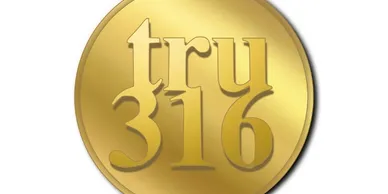
God’s First Words to the Woman in Genesis 3:16 on Four Fingers
by Bruce C. E. Fleming, Tru316.com
Hold up four fingers. These can represent the first four words God said to the woman in the Garden of Eden. These four words were unlike God’s words to the other two who were at the tree when Satan in the serpent attacked the woman and the man.
God’s words to the serpent and to the man followed a parallel pattern. In six ways God’s words to them touched on similar points.
God’s words to the woman were different. There was no curse on her or because of her as for the serpent and the man.
Here are all four Hebrew words in Line 1 of Genesis 3:16 that came after the words of introduction, “God said to-the-woman”:
(word 1) Multiplying
(word 2) I-will-multiply
(word 3) your-sorrowful-toil
(word 4) and-your-conception.
God’s first two words are the same word in Hebrew. God repeated it for emphasis. The verb, “to-multiply,” was familiar to the woman. She had heard it on Day 6 when God blessed her and her husband and said to them, “Be fruitful and multiply, and fill the earth …” (Genesis 1:28).
Then God said to the woman that two things (words 3 and 4) would be multiplied, or would surely come to pass. God said she would experience “sorrowful-toil” (‘itsabon in Hebrew). And God said she would experience “conception” (heron in Hebrew).
The first two fingers. Words 1 and 2 — “to multiply.” In Genesis 3:16, this action word was repeated in a way which spoke of things that were sure to come to pass. Most translations get the idea across in the English phrase, “I will surely multiply.”
To repeat “to multiply” in this way was done only three times in the Old Testament (Genesis 3:16, 16:10, 22:17). Each time these words came from God. Each time the word “seed” or “offspring” was used along with them.
“Seed” was a meaningful word. It spoke of a seed, but it contained within it the possibility of many seeds, or descendants. For example, God made this promise after he blessed Abraham, “I will surely multiply your seed … and in your seed all the nations of the earth shall be blessed, because you have obeyed my voice” (Genesis 22:17).
The third finger. Word 3 — “sorrowful-toil.”God told the woman she would experience two things. She would have (word 3) “sorrowful-toil” and (word 4) “conception.”
The man would be told about this “sorrowful-toil” in the next verse, in Genesis in 3:17. They would experience the same “sorrowful-toil.” The single cause of it would be God’s curse on the ground because of the man.
All food would have to come from the cursed soil. It would be this “sorrowful-toil” the woman and the man would experience. It had to do with raising food.
When God told the woman she would experience “sorrowful-toil” the earth had not yet been cursed. This prophecy told what would happen but not what would cause it to happen.
The word “sorrowful-toil” (‘itsabon) was a very rare word. In addition to God’s prediction of it to the woman in Genesis 3:16 and God’s announcement of it to the man in Genesis 3:17, it was used in Genesis 5:29. In Genesis 5:29 its meaning was the same.
When the parents of newborn Noah named him, they expressed their hope that life would be better because of this child. They hoped he would provide them relief from the “sorrowful-toil” they were experiencing as the result of the curse on the soil. They “… called his name Noah, saying, ‘This one will comfort us concerning our work and the sorrowful-toil of our hands, because of the ground which the Lord has cursed.’”
This was not just any kind of work. The English words “work” or “toil” are not nearly as precise as the Hebrew word. It was a very specific kind of toil, a “sorrowful-toil.” It meant: “the-sorrowful-toil-which-results-from-God’s-curse-on-the-soil.”
This is the bad news God announced to the woman. She would have “sorrowful-toil.”
The fourth finger. Word 4 — “conception.” The woman had heard God tell Satan in the serpent about her “seed” (Genesis 3:15). In Genesis 3:16, God spoke to her directly about her seed. The meaningful word “conception” was used for seed.
Many people have missed the connection of the promised “seed” in verse 15 with the promised “conception” in verse 16. To conceive and have seed or descendants was good news! It was a look into the woman’s future. It was also a look into victory over her enemy!
Sadly, many translations make it look as if God’s first words to the woman in Genesis 3:16 had all bad news, or even something like a curse, for the woman. Not so!
From our place in history, it is possible to see the whole line of descendants who were conceived from the first woman down to Mary, the virgin who conceived by the Holy Spirit (Luke 3:23-38, Galatians 3:16). Mary’s child Jesus was the Seed to crush the serpent’s head!
What about the translations of Genesis 3:16 that have said that God spoke about “pain in childbirth?”
God did not speak about “childbirth” in these first four Hebrew words to the woman. God
spoke of “conception.” Conception took place nine months before childbirth!
God did not speak to the woman about “pain.” God spoke to her about the “sorrowful-toil”
that would be involved in raising crops from the cursed ground.
There is nothing about “pain in childbirth” in the first four Hebrew words of Genesis
3:16. This must be kept in mind in order to clearly understand the rest of God’s words to the
woman in Genesis 3:16.
More? Please visit www.Tru316.com

